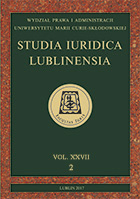Constitutional Issues Arising from the Principal Purpose Test: The Lesson from Poland
Constitutional Issues Arising from the Principal Purpose Test: The Lesson from Poland
Author(s): Błażej KuźniackiSubject(s): Constitutional Law, International relations/trade, Law on Economics, Fiscal Politics / Budgeting, EU-Legislation
Published by: Wydawnictwo Naukowe Uniwersytetu Marii Curie-Sklodowskiej
Keywords: tax avoidance; agreements on UPO; OECD; BEPS; PPT; general clause; constitutionality;
Summary/Abstract: The principal purpose test (PPT) has been chosen by all signatories to the Multilateral Convention to Implement Tax Treaty Related Measures to Prevent Base Erosion and Profit Shifting (MLI) signed in Paris, on 7 June 2017, with a view to meeting the minimum standard as set out in the Action 6 Report, “Preventing the Granting of Treaty Benefits in Inappropriate Circumstances”. The PPT was considered the easiest way to meet the minimum standard, since it is a self-standing and default option. It was also considered the preferable approach by the tax administrations of the signatory States because it gives them such wide discretionary powers. While this level of discretion follows from the rather vague language of the PPT, it also raises issues in respect of its constitutionality. One may ask, in particular, whether the PPT meets the constitutional standards of the rule of law, as generally manifested under the principle of legal certainty. This study examines the constitutionality of the PPT through the lens of the Polish Constitution and respective jurisprudence of the Constitutional Tribunal (CT). The author finds that the PPT may be seen as unconstitutional not only under the Polish Constitution, but also (by analogy) under the constitutions of many other democratic countries, raising serious concerns at a legislative level and, when and if implemented, in its application.
Journal: Studia Iuridica Lublinensia
- Issue Year: 27/2018
- Issue No: 2
- Page Range: 95-115
- Page Count: 21
- Language: English

